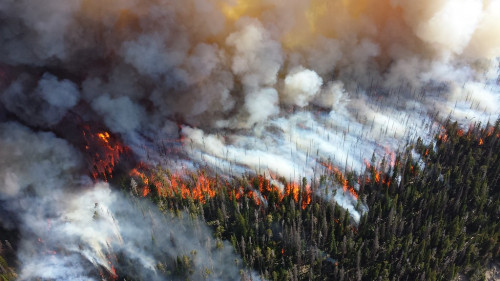WEBINAR: Energy Disruptions and Resilience
Climate change is increasing the frequency and severity of grid-threatening weather events, including storms and wildfires, at a time when the grid itself is undergoing significant changes. These challenges require decisionmakers to understand the impacts of energy system failures, how to mitigate them, and how to increase overall grid resilience. At this event, several researchers discussed their ongoing projects aimed at these issues and shared their initial findings. We also heard from the Deputy Executive Director for Energy and Climate Policy at the California Public Services Commission about the Commission's efforts to promote reliable and resilient energy in California.
View a recording of the event here.
Read a blog post that summarizes key takeways from the event here.
Speakers will include:
- Dr. Duncan Callaway is a Professor of Energy and Resources with an affiliate appointment in Electrical Engineering and Computer Science at the University of California, Berkeley. He is also a Faculty Scientist at Lawrence Berkeley National Laboratory. He received his PhD from Cornell University and subsequently worked in the energy industry, first at Davis Energy Group and later at PowerLight Corporation. He was a member of the research faculty of the Center for Sustainable Systems at the University of Michigan before joining UC Berkeley. Dr. Callaway’s teaching covers energy systems with a focus on the electrical grid and energy efficiency. His research group focuses on emerging energy technologies by quantifying their impacts on power system operations and developing control, optimization and data analysis tools to facilitate their integration into power systems.
- Dr. Mikhail Chester is the Director of the Metis Center for Infrastructure and Sustainable Engineering at Arizona State University where he runs a research program focused on preparing infrastructure and institutions for the challenges of the coming century. His work spans climate adaptation, disruptive technologies, innovative financing, cybersecurity, and modernization of infrastructure management. He is broadly interested in how we need to change infrastructure governance, design, and education for the Anthropocene, an era marked by acceleration and uncertainty. He has recently led several large networks to advance infrastructure in the face of unpredictable and increasingly complex environments including the NSF Urban Resilience to Extremes Sustainability Research Network and the NSF Resilience Convergence project. He was a co-author of the US 5th National Climate Assessment Transportation chapter, and a contributing author to the UN IPCC’s 6th Assessment Report chapter on Cities, Settlements, and Key Infrastructure. In 2017 he was awarded the American Society of Civil Engineer’s early career researcher Huber prize. He has published two books: The Rightful Place of Science: Infrastructure in the Anthropocene, and Urban Infrastructure: Reflections for 2100, both available on Amazon.
- Dr. Erica Fischer, PE is an Associate Professor of Civil and Construction Engineering at Oregon State University. Dr. Fischer’s research interests revolve around innovative approaches to improve the resilience and robustness of structural systems affected by natural and man-made hazards. Dr. Fischer performs research on a variety of different structural systems including steel, timber (CLT), composites (concrete-CLT and steel-concrete), and thin shells subjected to hazards such as earthquakes and fires. She has participated in post-earthquake reconnaissance team missions in diverse regions including Haiti, Napa, California, Italy, and Mexico City; and led post-wildfire reconnaissance after the 2018 Camp Fire and 2021 Marshall Fire. Dr. Fischer has experience as a practicing structural engineer and holds a Professional Engineering license in the states of Washington, California, and Oregon. She is Co-Chair of the ASCE Fire Protection Committee.
- Leuwam Tesfai was named the California Public Utility Commission’s Deputy Executive Director for Energy and Climate Policy, effective July 1, 2022. She previously served as Commissioner Genevieve Shiroma’s Chief of Staff and Legal Advisor, a position she held since 2019 when appointed by Governor Gavin Newsom. She has worked at the CPUC since 2011 in several roles including as an Advisor to former Commissioner Liane M. Randolph and in the CPUC’s Legal, Energy and Administrative Law Judge Divisions. Leuwam’s private sector experience includes renewable energy markets, siting and permitting generation facilities, and commercialization of clean energy technologies. She is a graduate of Emory University and the University of San Francisco School of Law.
- Dr. Minhong Xu (moderator) is an economist at the Institute for Policy Integrity. She specializes in environmental economics and real estate and urban economics. Her research characterizes urban economic resistance to disaster risks, explores environmental sustainability in natural resources exploitation, and identifies new engines and pathways of community development. Her research seeks to understand and assess social, economic, and legal mechanisms that can be employed to promote equitable economic development and environmental justice.
This webinar was part of a series highlighting environmental and energy research projects funded by the Alfred P. Sloan Foundation.

